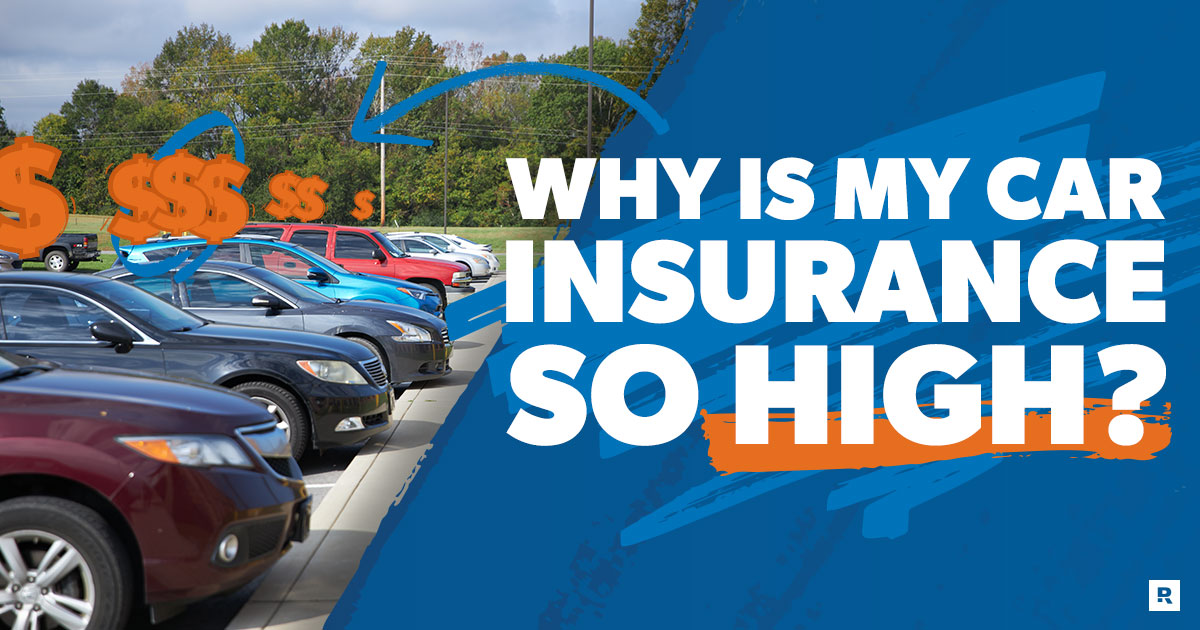
Have you looked at your car insurance bill recently? As you shake your head at the amount you owe and think about all the other things you would rather spend that money on (like travel, or clothes, or queso) a few questions probably pop up.
Like, Why is my car insurance so high? or Why have my premiums gone up again?
Let’s look at why your auto insurance prices might be so high and what you can do to stop rising premiums from cramping your budget.
Why Is My Car Insurance So High?
There could be a bunch of reasons why you’re paying so much for car insurance. Some of the most common factors that influence how much you’re paying for insurance are your deductible, the kind of car you drive, driving record, claim history, commute, credit score, history of paying for insurance, your location, age, gender, and add-ons to your policy. Let’s break it down.
Your Deductible
Your deductible is how much money you’re on the hook for when something happens to your car and you file a claim to get it fixed. It’s what you pay to fix your car before your insurance company covers the rest. If your policy has a lower deductible, that means the insurance company takes on more risk. You’ll pay less for the repairs in the moment, but you’ll have higher premiums as a result.
Your Car’s Value
In case you haven’t noticed, everything is more expensive these days, and cars are near the top of the list. The average cost of a new car got close to $50,000 by the end of 2022.1 (And here I was thinking $6 for a Starbucks drink was out of control.)
Even if you bought your car before the spike we’ve seen over the last few years, its value has still likely gone up. And basic economics tells us that higher car values equal higher insurance costs. So even if you don’t have a super expensive luxury car, your car’s value could be affecting your insurance rate.
Vehicle safety can also affect your insurance prices. Cars that do well on safety tests, like the Insurance Institute for Highway Safety test, have lower insurance premiums.
Look up the safety ratings the next time you’re shopping for a car, or ask your insurance agent how your car’s rating might affect your premium.
Your Driving Record
Speeding tickets, DUIs and other violations will skyrocket your rates, but a safe driving record can lower it. Some insurance companies even offer good-driver and safe-driver discounts. See if you qualify for one of these to lower your existing rate.
Your Claim History
Even though it’s their job, insurance companies don’t like it when you file a lot of claims. And they definitely don’t like big claims. Anything from a couple fender benders to wrecking one too many cars will increase your premiums. Consider skipping a claim and paying for smaller repairs out of pocket to avoid raising your rates.
Your Commute
Long commutes or traveling on especially dangerous highways will increase your rates. That’s why insurance companies ask where you work on your application. While you’re probably saving big on your housing expenses by commuting, it’s hiking up your car insurance.
Now, you don’t need to pack up your stuff and move—it’s not worth it just to save a little on your insurance. But if you’re already looking to move, a smaller insurance premium may come as a bonus.
Your Credit Score
If you’ve got a credit score under 600, you’ll pay more for car insurance. Of course, you can wind up with a cheaper rate by improving your credit score over time, but I don’t like that idea. There’s a better way to go about fixing this problem: getting rid of your credit score completely.
Don't let car insurance costs get you down! Download our checklist for easy ways to save.
I know, I know, that sounds totally weird. But you’ll be better off in the long run if you stop messing around with debt altogether. Yep—this means paying off your debt and never using credit cards, payment plans or any kind of financing again. Eventually, your credit score will dwindle all the way to zero, and you’ll have more cash in your pocket because you won’t have any debt payments. And by the way, you won’t miss those payments, credit cards or your credit score.
Here’s the truth: A credit score is nothing more than a number that says how much you love debt. And debt is not your friend—it keeps you from having any money margin in your life.
So instead of pulling out your credit card and swiping your way to a more affordable car insurance premium, pull out a pair of scissors and cut that credit card up. You’ll thank me later when you’re no longer drowning in the high-interest payments those predatory companies lock you into.
Your History of Paying for Insurance
Lapses in coverage can also cause your premiums to spike. It’s the law to have car insurance if you own a car, and you’ll pay the price if you haven’t had a policy for a period of time. So, to avoid higher premiums, make sure you’ve always got car insurance if you own a car. In some situations, it’s even a good idea to have insurance when you don’t own a car—that’s called non-owner car insurance. (Clever name, huh?)
Your Location
If you live in a big city or an area with lots of traffic accidents, then your premiums will be high compared to suburban or rural parts of the country. Insurance companies look at the number of claims made in the area, the crime rate and the population density. If any of these are high, your insurance rate will be too.
Your Age and Gender
Believe it or not, insurance companies also look at age and gender to determine insurance rates. Drivers under 25 and over 75 tend to have higher rates, since insurers see their policies as high-risk insurance. And in some states, women pay more for car insurance than men—in some cases, over $100 more each month.2
Certain states, like California, Hawaii and Massachusetts, have banned insurance companies from using gender to determine premiums. But for the rest of the U.S., it’s pretty common.3
Add-Ons to Your Policy (and Who It Covers)
Car insurance plans with lots of add-ons have higher premiums. Look at your policy and decide if you really need everything you’re paying for. If you only buy the coverage you need, you can ditch the extras and lower your premium. More on this later.
Car insurance for teenagers is also more expensive, so if you’ve got a teen on your policy, that’ll jack up your rates. The same goes for elderly family members. Luckily, some insurance providers offer discounts on policies with teenagers if they have good grades or a safe driving record. Take advantage of these perks to lower your existing rate.
Save Money With an Insurance Bundle
A RamseyTrusted pro can hunt down the best car and home insurance deals to get you quality coverage without breaking the bank.
How to Lower Your Car Insurance Premiums
Sure, car insurance rates may be in the stratosphere in some places. But are you really destined to pay sky-high rates forever? No way. The truth is that most people are overpaying for coverage by hundreds of dollars! If that’s you, here are some ways you can lower your premiums fast:
1. Raise Your Deductible
If you have at least $1,000 saved for emergencies, raise your deductible! Having a higher deductible means lower premiums, since you’re taking on more risk. But you’ll have more money in the bank to cover that higher deductible if you get in an accident and, almost always, you’ll wind up saving money in the long run.
2. Get Rid of Coverage You Don’t Need
Let me be very clear: There are certain types of car insurance you should almost always have in place. Those include liability, comprehensive and collision coverage. Together, these three kinds of insurance give you full coverage—from injuries and damage done to others to theft and damage done to your own car.
But there are also plenty of types of coverage you can probably drop from your policy to shave some of the cost from your premiums. Here are some coverages you might consider cutting if they’re not required in your state:
- Extended Coverage
- Guaranteed Auto Protection (GAP)
- Personal Injury Protection (PIP)
3. Bundle Your Policies
Let’s say you’ve got homeowners insurance and auto insurance through two different insurance providers. Well, if you were to bundle those policies by getting rid of one (or both) of them and buying your insurance through one provider, you’d be able to conveniently manage your policies and save money on premiums.
Some companies say they can save you up to 25% when you bundle your insurance, and it might not be a bad idea to investigate whether that’s a promise they’ll keep.
But there is a chance that bundling insurance won’t be cheaper for you. Depending on what you need, buying policies from separate companies could be the cheaper option.
For example, let’s say you’ve got a modest car and an expensive home. If the provider offers a bundle with expensive car insurance but cheap homeowners insurance, you may find better coverage at a better deal by breaking up the bundle. Review your policy and compare rates to see what might work best for you.
4. Compare Quotes From Different Providers
Think about it: When was the last time you shopped around for car insurance and compared quotes? Was it when you bought your car? A year or two ago? During the Cold War? Yeah. It’s high time to check on those policies (and probably replace your air filters too).
If you have a clean driving record, comparing quotes could save you hundreds of dollars. That’s why it’s a good idea to look for a better deal at least once a year. You have nothing to lose and potentially hundreds of dollars to gain!
Work With an Independent Agent
A lot of people make the mistake of working with an insurance agent who can’t (or won’t) compare quotes from different insurance companies (those are called captive agents). Bad idea, people! You want someone who is committed to getting the best deal for you—not for the insurance company that pays them. And our team at Ramsey knows just the right people to call.
We back RamseyTrusted agents in your area as part of our Endorsed Local Providers (ELP) program. These top-notch pros will help you compare rates across highly rated companies to find the right coverage at the right price. That way, you know you’re getting the most bang for your buck when it comes to auto insurance.
-
How can I lower my car insurance fast?
-
The quickest and easiest way to lower your car insurance premiums is to raise your deductible. Almost always, higher deductibles = lower premiums.
-
Does a credit score affect car insurance?
-
Yes. If you have a credit score under 600, you’ll pay more for car insurance. Having no credit score is a whole lot better than having a low score. Luckily, there’s a tried-and-true solution to getting rid of it: cutting up your credit cards and ditching debt forever
-
Is insurance higher on new or old cars?
-
Since new cars tend to be more valuable than old cars, car insurance rates are usually higher for new cars. However, it’s possible that an insurance policy for an old car that’s worth more will cost more than a policy for a new car that’s worth less. It all comes down to the value of the car being insured.


